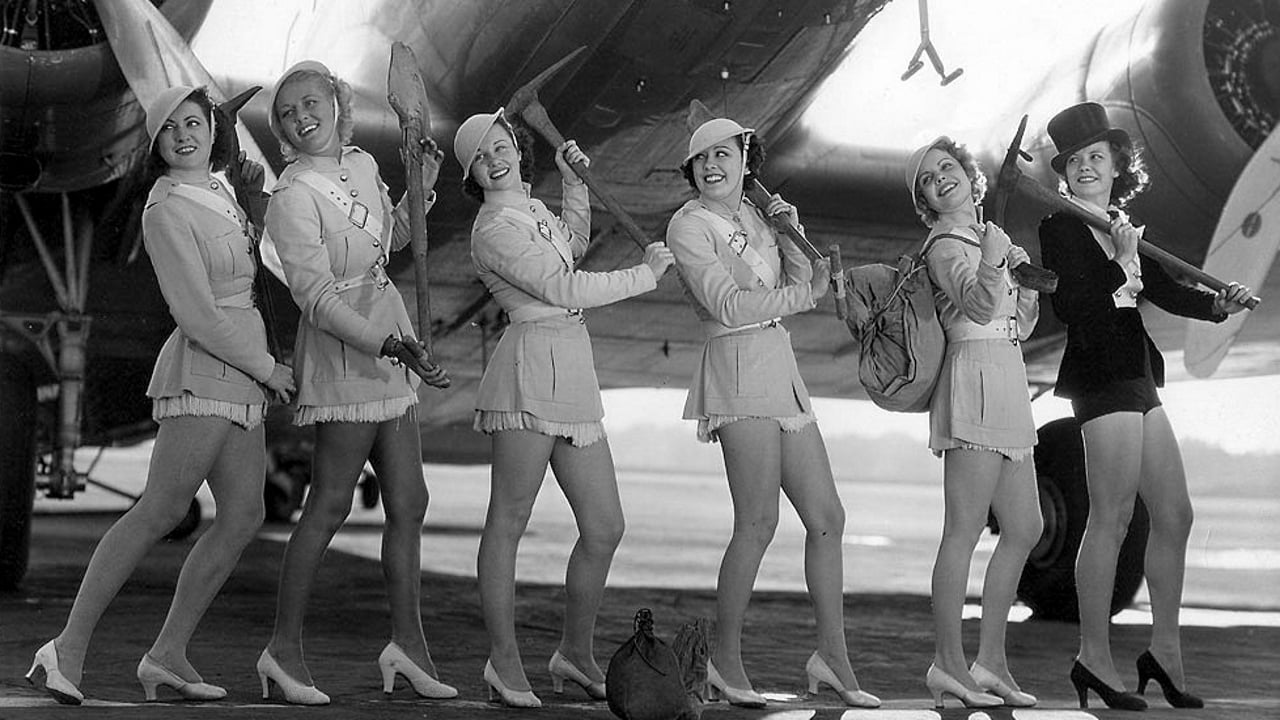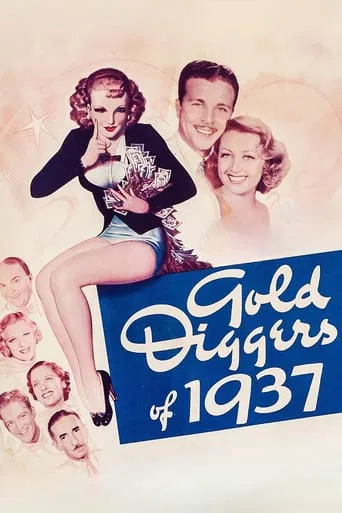

Rossi (Dick Powell) sells a life insurance policy worth $1 million dollars to JJ Hobart (Victor Moore). He then sticks beside him to ensure that he doesn't kick the bucket. If he does, Rossi loses his income and he needs it to settle down with Norma (Joan Blondell) who has scammed a job as a receptionist for the insurance company. At the same time, a couple of JJ's managers who have spent all of his finances need the insurance policy money to stage the next show and scheme to bump him off with the help of Norma's friend, Gen (Glenda Farrell). Things work out for a happy ending and there are musical numbers thrown into the proceedings.Unfortunately, none of them are particularly good. We are subjected to that irritating form of spoken-word singing a couple of times. Joan Blondell is the offender. However, she is funny at the beginning of the film when going for a job as a receptionist. Glenda Farrell steals every scene that she's in and changes from a wise-cracker to a cold-hearted cow to the gold-digger with a heart of gold. Dick Powell is good in the lead role and has some funny scenes, eg, he is a salesman that hates sales. Good for him. The cast are enjoyable to watch......except Victor Moore. He is an unfunny, irritating man with a flat head who looks mentally retarded and has the most annoying, whiny, slurry speech pattern. I rather hoped that the baddies would get their way with him.The music numbers were a bit of a let-down for me coz I don't like war themes with soldiers and marching and all that crap but if you like marching and flag-waving, then you'll probably enjoy a couple of the set numbers including the finale. Busby Berkeley has done much better than this. Overall, the main cast make the film watchable (NOT Victor Moore) and it's OK. Nothing more.
... View Morewhat a great musical this was! in fact, it contained of three individual parts.the first part was the introduction, where we got to know the story and the characters. this was quite boring, I tried to concentrate on the visuals rather than on the story.the second part, however, was intriguing. it showed us love can appear on every age and the intrigue was interesting too.the third part was beautiful and certainly one of the best endings from a Busby Berkeley musical. everything ended as it should be. I left the room with a good feeling. it's a shame pictures as these aren't made anymore today. long live Gold Diggers of 1937, without a doubt the best of the Gold Diggers series!
... View MoreBusby Berkeley musicals are always great fun to watch regardless of the storyline because of the outstanding musical sequences. Berkeley's Gold Diggers series contains some of the most exciting. Gold Diggers of 1937 is possibly the worst of the lot, but it still isn't bad. With a great cast and an interesting finale, this film is a must for fans of early musicals.Dick Powell stars as an insurance salesman with a terrible record. He bumps into Joan Blondell on a train one day and finds his luck steadily increasing from there. Soon, he gets a client (Victor Moore) to open a million dollar insurance policy, which makes him begin to hear wedding bells. However, his client is not very young, nor is he very healthy. His business partners are counting on this. They've gambled his fortune away and now have no other way to cover their backs. With plotting from both sides, poor old Mr. Hobart is in for a heck of a ride.Unfortunately, this film reads much more like the b-pictures that Powell and Blondell made during the slump in their careers than like the instant classics they were teamed up in at the beginning of their careers.There are only a few songs used throughout this film, and none of them are as catchy as the ones from past installments. Still, they're created quite well visually. "Speaking of the Weather" features two stagings, the first in an office as a tet a tet between Powell and Blondell and the second at a big party. This version features an excellent tap routine. The big finale is "All is Fair in Love and War" which features a bevy of beautiful girls rocking in rocking chairs and bombing their beaus from across a largely black screen.
... View MoreA nostalgic look at the old-fashioned (and very corny) musicals of the '30s produced by WB is the only reason for viewing this oldie with Dick Powell and Joan Blondell. Not even the veteran scene-stealer Victor Moore is able to salvage the silly plot nor the shenanigans of the scheming Glenda Farrell. The weak excuse for a story is all about being able to put on a Broadway show--namely, getting the money to fund it. When the show finally does get staged, it's done in Busby Berkeley style with camera effects that couldn't possibly be duplicated in a real stage show--including trick special effects. But of course, all logic disappeared when watching musicals such as this in the '30s and depression weary audiences probably couldn't have cared less.One of the crafty villains Morty Wethered (Osgood Perkins) is played by Anthony Perkins' father. And if you look real fast, you can spot Jane Wyman who has one line to speak as a chorus girl.The tunes are nothing to shout about but "Speaking of the Weather" is done in charming style with Powell and Blondell in a rainy day office scene and later reprised during the poolside sequence. "All's Fair In Love and War" is the big finale--but ultimately the viewer is left with the feeling that this has all been done before and with better results in previous "Gold Digger" films. Most earnest emoting in the film is done by Dick Powell who breezed through his Warner musicals with confidence and charm.
... View More